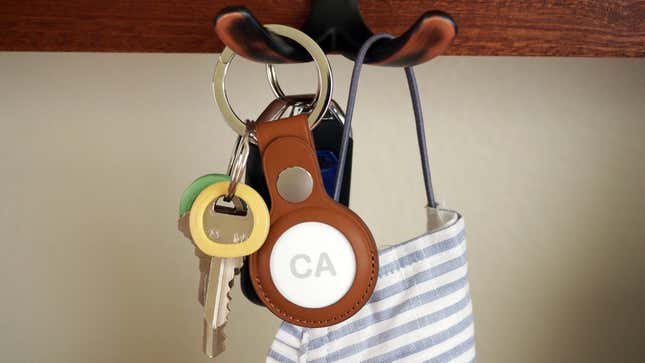
Apple is making more changes to its AirTag trackers as it attempts yet again to prevent them from being used for malicious purposes.
Apple’s AirTags debuted last year to much fanfare but their arrival has largely been overshadowed by privacy concerns—an issue we mentioned in our initial AirTag review. It quickly became clear that the safeguards Apple put in place to guard against unwanted tracking only did so much. The company subsequently rolled out an update to prevent stalking, but AirTags continued to be used for criminal and malicious purposes.
As part of its effort to prevent AirTags from aiding in illegal activity, Apple now says it will partner with law enforcement to provide paired account details should police issue a subpoena or “valid request.” The company claims to have already worked with law enforcement to successfully find suspects, which has led to them being arrested and charged.

Furthermore, Apple listed several updates coming to AirTags to better inform customers of the purposes of AirTags and the risks of misusing them. Once the update is installed, users setting up their AirTag for the first time will see a message warning them that tracking is illegal and that law enforcement can request identifying information about the AirTag owner.
An update will also remove the vague terminology “Unknown Accessory Detected.” Now when an AirTag, a pair of third-gen AirPods, AirPods Pro, AirPods Max, or a third-party Find My network accessory that has been separated from its owner are near you, you’ll receive an alert on your iPhone about the device. The “Unknown Accessory Detected” alert will still appear in some instances, according to Apple, but “only if a set of AirPods or a Find My network accessory is detected near you, not an AirTag,” the company said. “These could be borrowed AirPods, or AirPods inadvertently left behind by a friend or family member.”
Set to be introduced “later this year” is an update to an existing AirTag feature called Precision Finding. Once it arrives, the feature will point iPhone users to the exact location of unknown nearby AirTags. iPhone 11, iPhone 12, and iPhone 13 users will be able to see distance and directions to the AirTag through a combination of sound, haptics, and visual feedback.
We recently wrote about how AirTags were being sold on Etsy with the speaker physically disabled, preventing them from emitting a beeping sound to alert anyone nearby of its presence. Soon, Apple will augment that sound with an alert sent to your device if it determines that an errant tracker is following you. Other minor updates will change the tone of the AirTag’s ping to make it easier to hear and further optimize Apple’s unwanted tracking alert system.
“AirTag was designed to help people locate their personal belongings, not to track people or another person’s property, and we condemn in the strongest possible terms any malicious use of our products,” Apple wrote in a blog post. “Unwanted tracking has long been a societal problem, and we took this concern seriously in the design of AirTag.”
AirTags are $29 circular white trackers that help you find lost items using various technologies, including Bluetooth and Apple’s ultra-wideband U1 chip. For items that aren’t nearby, Apple taps into the 1 billion devices connected to its Find My network; when one of those devices comes in close proximity to a lost AirTag, it sends location information to the owner. GPS isn’t used and the information relayed between devices is anonymous and encrypted so nobody else knows where your lost item is hiding.
These security measures reassure users that their items can’t be discovered by other iPhone owners, but they don’t address unwanted tracking. For that, Apple sends an alert (for iPhone users) or chime (to Android phones) to those being tracked when an AirTag registered to another user is hanging around for too long. It’s a welcome privacy measure, except that it didn’t work when we tested it—the person whose car seat we sneakily planted an AirTag underneath (with their consent, of course), never received a notification.
Things were decidedly worse for Android users who were only notified via a ping after “an extended period of time.” In December, Apple gave Android users more control by releasing a Tracker Detect app that lets you manually search for unwanted AirTags. Apple also added a “Items That Can Track Me” label in the iOS 15.2 beta that lets users scan for nearby items that could be used to track them, then provides instructions on how to disable them. (That feature hasn’t yet been released publicly.) Apple also shortened the time an AirTag needs to be separated from its owner before alerting nearby users from three days to a “random time inside a window that lasts between 8 and 24 hours.”
Despite these measures, privacy advocates have strongly criticized these disc-shaped devices, cautioning customers of their ability to enable stalkers to track people. Unfortunately, these ominous warnings were accurate, as there have since been multiple reports of AirTags being used for stalking with cases occurring as recently as last month. Recent reports have also shown how AirTags are being used to steal cars.
The new features are another step toward making AirTags less useful to stalkers, but the fact that the misuse of this device wasn’t more carefully considered before its release remains concerning.
Updated Feb. 10 at 7 p.m. ET/4 p.m. PT: This story has been corrected to clarify the circumstances in which iPhone owners will see an “Unknown Accessory Detected” alert.